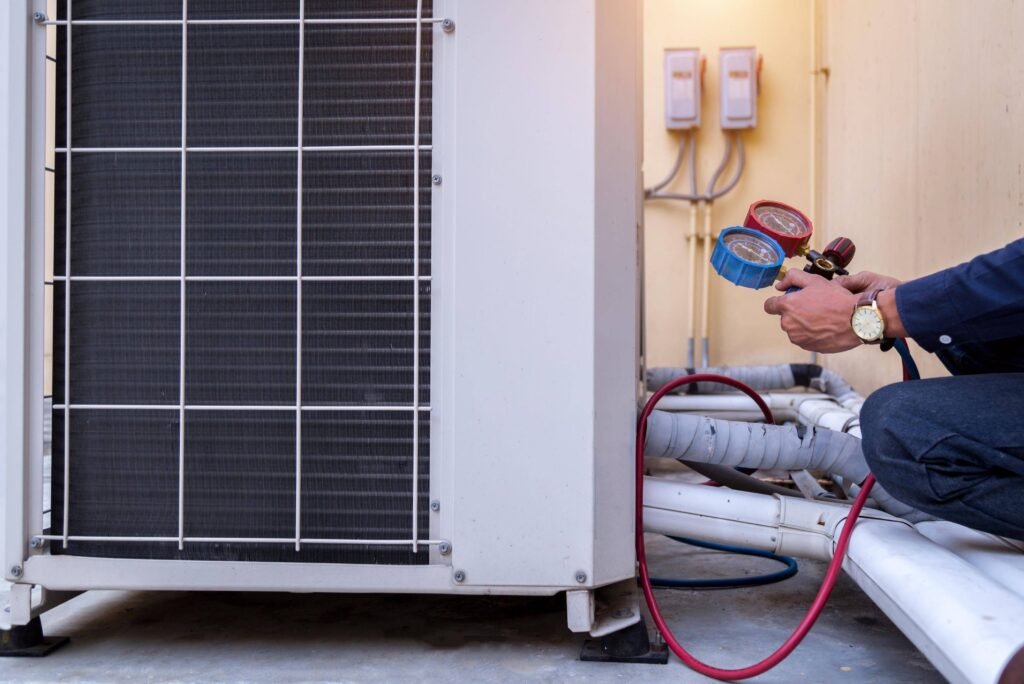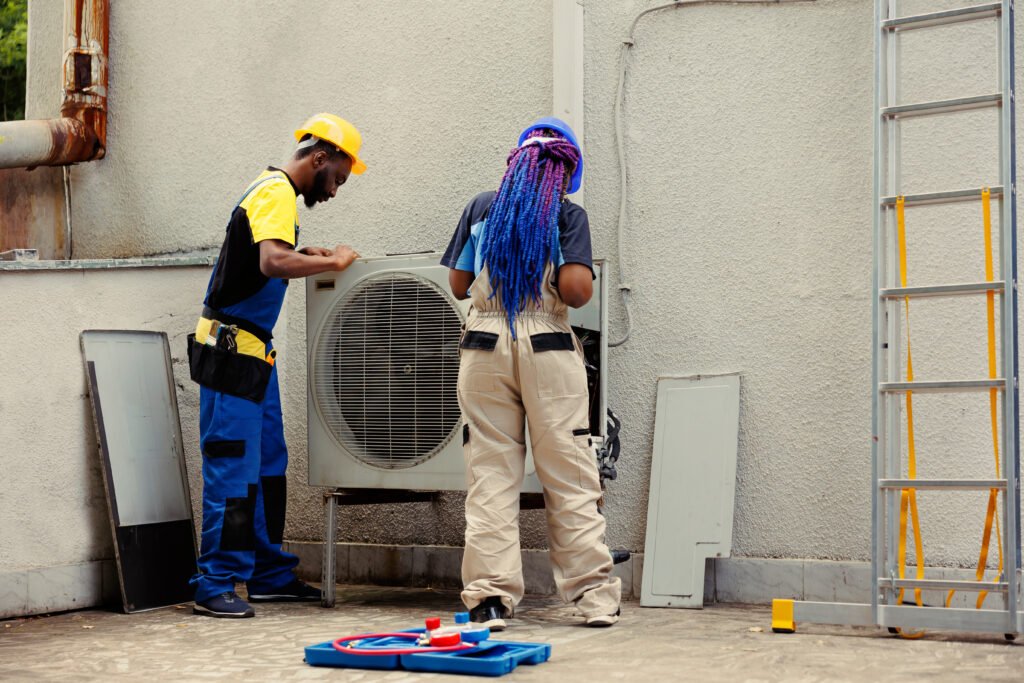When the AC is not cooling, especially during a heatwave, frustration runs high. Whether it’s a heat pump service issue or a mechanical glitch, the discomfort is real. But before you pick up the phone to schedule a costly heat pump repair service, there are a few practical steps you can take to troubleshoot the problem yourself.
In this guide, we’ll walk you through the most common reasons why your AC unit is not cooling, what symptoms to look for, and when to call in professional heat pump services. You’ll learn how to assess both heating and cooling maintenance issues and how to prevent future breakdowns with smart heat pump servicing.

Check These First When the AC is Not Cooling
- Thermostat Settings
Start here. Set your thermostat to “cool” and drop the temperature several degrees lower than the current room temp. Seems basic, but many AC not cooling house complaints trace back to this simple setting.
- Dirty Air Filters
Clogged air filters restrict airflow, preventing the system from distributing cool air. Replace filters every 1-3 months depending on usage. This step is essential for both heating system maintenance and cooling performance.
- Tripped Breaker or Blown Fuse
It is running but your AC unit not cooling might not be running at all, you’re just hearing the fan. Head to your breaker box. If a breaker has tripped, flip it back. If it trips again, you may need local heat pump service to inspect electrical components.
- Outdoor Unit Blocked
Debris, dirt, or plant growth around your outdoor condenser can cause the AC not blowing cool air. Clear away leaves, dirt, or furniture blocking airflow. Regular heat pump cleaning prevents these obstructions from building up.
- Refrigerant Leaks
Low refrigerant means no cooling. It’s not something you can fix yourself, only a qualified heat pump service technician can inspect and refill it. If your ac stopped cooling suddenly, this could be the culprit.
Deeper System Checks You Can Try Before Service Calls
- Inspect the Air Handler
Dust buildup inside the handler or blower can hinder airflow. Carefully vacuum around the blower and duct entrances (with power off). Doing this as part of routine heat pump servicing can keep your system operating efficiently.
- Listen for Unusual Noises
Buzzing, clicking, or rattling sounds can signal electrical issues, loose components, or dying capacitors. If your ac is not cooling enough, these noises are often the first sign of trouble.
- Check Vents and Registers
Walk around the house and ensure vents are open and unobstructed. Blocked registers can make it seem like your home AC is not blowing cool air, when in fact, it’s just poor airflow.
When to Call for Heat Pump Services
If you’ve gone through the checklist and your AC unit is not cooling, it’s time to book professional heat pump services. Calling early can prevent bigger problems like total system failure or compressor burnout.
- Schedule a Heat Pump Tune Up
Yearly heat pump tune ups extend system lifespan and catch hidden issues early. They’re a must for efficient operation and should include cleaning coils, checking refrigerant levels, and inspecting electrical connections.
- Don’t Delay Heat Pump Repair Service
The longer you run a malfunctioning unit, the higher your repair bill may get. If your AC stopped cooling, turn it off until you get help. This protects internal components from unnecessary strain.
- Ask for Air Source Heat Pump Servicing
If your system uses an air-source unit, be specific when calling. Air source heat pump servicing requires specialized understanding of the air source heat pump service plate, which contains unique performance metrics and refrigerant data.
Heat Pump Maintenance Tips to Prevent Cooling Issues
Staying ahead of problems with routine heating and cooling maintenance can save you money and discomfort. Here’s how to stay proactive:
- Replace filters regularly (every 30-90 days depending on use)
- Keep outdoor units clear of debris and clean the coils
- Schedule seasonal heat pump tune up services
- Test thermostat calibration once a year
- Monitor airflow in all rooms for consistency
These habits can extend the lifespan of your system and reduce emergency calls for heat pump repair service.
Insights Experts Don’t Talk About (But Should)
Most articles gloss over the real reason AC is not cooling as poor system design or improper installation. Even new systems can underperform if not sized or ducted correctly. Ask your heat pump service technician if your system has been properly load-calculated for your space.
Also overlooked? The impact of zoning. Homes with inconsistent cooling often suffer from poor air distribution. Smart zoning and dampers can resolve issues that no amount of heat pump servicing will fix.
Lastly, don’t underestimate the effect of humidity. In overly humid climates, your ac unit not cooling may actually be overworked trying to dehumidify. An added whole-home dehumidifier can drastically improve performance.

Final Checklist Before You Call a Technician
- Is the thermostat set correctly?
- Have you replaced or cleaned the air filter?
- Is the outdoor unit free of dirt and debris?
- Are your vents open and unblocked?
- Did you check the circuit breaker?
- Do you hear any odd noises?
- Is the system short-cycling (turning on and off frequently)?
Conclusion:
Stay ahead of breakdowns by staying informed. If your AC is not cooling, don’t ignore it. With proper care, professional heat pump services, and consistent maintenance heat practices, you can keep your system running like new and your home comfortable, year-round.
Trusting your system to professionals who understand your environment and system type from air source heat pump servicing to complete heating cooling AC inspections is key to year-round comfort.
If all these boxes are checked and you still notice your AC not cooling, reach out to a local heat pump service like Temperature Zone.
Frequently Asked Questions
Why is my AC unit not cooling even though it’s running?
Your system could have a clogged filter, low refrigerant, dirty coils, or a thermostat misreading room temps. Start with basic checks before calling a heat pump repair service.
How do you maintain a heat pump?
Regular filter changes, coil cleaning, and seasonal heat pump tune up services are essential. Always schedule professional heat pump servicing once or twice a year.
What is included in air source heat pump servicing?
It includes coil and filter cleaning, checking the air source heat pump service plate, refrigerant level inspection, electrical testing, and sometimes airflow balancing.
How often should I schedule heating system maintenance?
Twice a year is ideal: once before cooling season and once before heating season. This keeps your system clean and efficient.
Can I clean the heat pump myself?
You can clear debris and replace filters, but deeper heat pump cleaning like coil washes or electrical inspections should be left to a certified heat pump service technician.